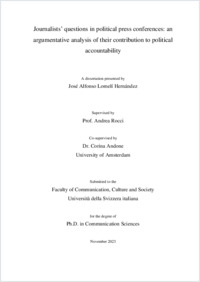Journalists’ questions in political press conferences : an argumentative analysis of their contribution to political accountability
- Lomelí Hernández, José Alfonso
- Rocci, Andrea (Degree supervisor)
- Andone, Corina (Degree committee member)
- 2023
PhD: Università della Svizzera italiana
English
The dissertation investigates the argumentative moves of journalists in press conferences to explain how their interventions shape discussions in these contexts. To achieve this aim, two bodies of research are used as foundation. The first one concerns research on journalistic questioning to understand the linguistic and strategic resources journalists employ when addressing authorities. The second body of research draws on argumentation theory to frame press conferences as discussions where rational exchanges are used to test the tenability of standpoints. Press conferences pose specific challenges for being analyzed from an argumentative perspective. On the one hand, the interaction between politicians and journalists brings dialogical situations to its limits because one party, namely the politician, interacts with several parties that bring discussions to different topics, elaborate on each other’s interventions, and promote different political agendas. On the other hand, the interactional rules of press conferences constrain journalists to ask questions and, therefore, questions are used in all possible ways to pursue journalists’ goals. The first paper of the dissertation develops a theoretical model to analyze journalists’ questions. The model distinguishes cases where journalists use questions to convey information from cases where they use questions to request information. Since the model is developed from an argumentative perspective, the result is a typology of questions that distinguishes different argumentative moves. Additionally, the paper highlights the importance of accountability in this context, considering that accountability requires journalists to perform specific moves to appropriately evaluate the position of authorities. The second paper investigates journalists’ argumentative moves empirically. For this purpose, a corpus of twenty-one press conferences held by seven institutions was annotated. The corpus is composed of press conferences addressing issues related to the Covid-19 pandemic. Results show that journalists displayed a wide array of argumentative moves, and the findings suggest that journalists are inclined towards retrieving information unless crises get intertwined with political turmoil. The analysis clarifies the extent to which journalists retained their deliberative aim in press conferences, and how their interventions shape discussions with authorities. In the last paper, journalists’ interventions in press conferences are confronted with discussions in social media. The point of the comparison is identifying the features that characterize accountability dialogues in each forum. For this purpose, a press conference and a corpus of tweets are analyzed according to the argumentative moves of participants to see how iv discussions contribute to accountability purposes. Results showed that both fora are concerned with holding politicians accountable, but each had different strengths and shortcomings. In the press conference, the discussion was more balanced, but journalists refrained from proposing solutions to the issue under discussion. On Twitter, there were plenty of arguments and opinions, but many of them were irrelevant for accountability purposes.
- Collections
- Language
-
- English
- Classification
- Information, communication and media sciences
- License
-
License undefined
- Open access status
- green
- Identifiers
-
- NDP-USI 2024COM004
- ARK ark:/12658/srd1328103
- URN urn:nbn:ch:rero-006-121932
- Persistent URL
- https://n2t.net/ark:/12658/srd1328103
Statistics
Document views: 383
File downloads:
- 2024COM004: 483
